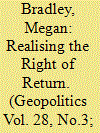|
|
|
Sort Order |
|
|
|
Items / Page
|
|
|
|
|
|
|
| Srl | Item |
| 1 |
ID:
184652


|
|
|
|
|
| Summary/Abstract |
The International Organization for Migration (IOM) became a related organization in the United Nations system in 2016, and has rebranded itself as the “UN Migration Agency.” This article examines the drivers and significance of IOM’s new relationship with the UN. It traces the evolution of the IOM-UN relationship, and the processes that led to IOM becoming a related organization. While some contend that IOM is still not really part of the UN system, through an analysis of the status and political positioning of related organizations this article demonstrates that, as a related organization, IOM is indeed now part of the UN system. It argues that IOM’s work with forced migrants in the humanitarian sector played a pivotal role in enabling this shift, and considers its implications.
|
|
|
|
|
|
|
|
|
|
|
|
|
|
|
|
| 2 |
ID:
191437


|
|
|
|
|
| Summary/Abstract |
Refugee repatriation rests on a fundamental norm: the right of return. The Office of the UN High Commissioner for Refugees (UNHCR) styles itself as the chief defender of international norms on refugees, educating refugees about their rights and socialising states to respect the cardinal rules of the refugee regime. However, UNHCR initially devoted little attention to the right of return. When UNHCR began to engage more actively with repatriation in the 1980s, it had only a nascent institutional conceptualisation of the right of return: it framed the implementation of the right of return as a non-political, humanitarian undertaking, and assumed sovereign states had largely unfettered discretion in its implementation. Drawing on extensive material from the UNHCR archives on repatriation movements from Honduras to El Salvador in the 1980s, this article examines how refugees themselves have influenced the governance of return by serving as norm entrepreneurs, localising the right of return and socialising UNHCR to rethink and support broader interpretations of this principle. It analyzes how Salvadoran refugees envisioned the right of return as a collective and deeply political process of asserting citizenship claims, and took direct action to implement this right, compelling UNHCR and government actors to adjust to their vision. These experiences have important implications for understandings of the right of return as an international norm, and the roles of refugees themselves as actors in norm localisation and socialisation processes. Reinforcing and expanding on recent studies of how refugees actively shape aid efforts, peacebuilding and the resolution of displacement, this study highlights the significance of subaltern power in the refugee regime, showing how it can reverberate across different sites and scales to definitively influence not only the execution of the regime’s core functions but also the interpretation of the normative commitments underpinning it.
|
|
|
|
|
|
|
|
|
|
|
|
|
|
|
|
| 3 |
ID:
131699


|
|
|
|
|
| Publication |
2014.
|
| Summary/Abstract |
Hannah Arendt's characterisation of the refugee as rightless and stateless has become a touchstone for scholars grappling with the nature of forced migration and exile. While aspects of Arendt's depiction continue to resonate, the notion of refugees as stateless, rightless 'scum of the earth' is now in many cases anachronistic, and no longer clearly reflects the challenges now faced by the majority of the world's refugees. This is attributable to structural changes in the refugee regime, particularly the increased focus on repatriation and the reconstitution of the relationship between refugees and their states of origin, a possibility largely unforeseen by Arendt. Drawing on the example of the Guatemalan repatriation movement, this article contends that indiscriminately portraying refugees as stateless represents a potential disservice to the displaced, as it may inadvertently undermine refugees' claims against their states of origin for the redress of their rights as citizens. There is a need to expand theorising on refugees from a narrow focus on the refugee as rightless and stateless to a broader conception of the refugee as a bearer of claims for the renegotiation of her relationship with her state.
|
|
|
|
|
|
|
|
|
|
|
|
|
|
|
|
|
|
|
|
|